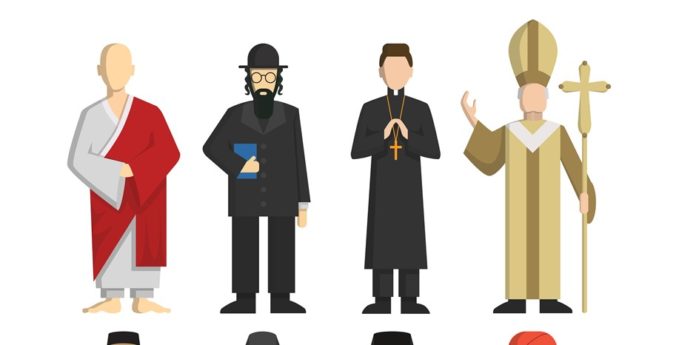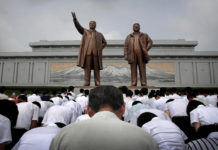In a perfect world, certain religious texts would be compulsory reading, not to try and convert people to those religions, but to help the public better understand how different religions compare and contrast with one another, how different religions relate to the cultures those religions helped to create, and how different religions are, or are not, compatible with each other, and with secular societies. The Bible covers two major religions, as the first five books are the Torah (Jewish bible), and the rest covers Christianity. The Bible should be required reading. The Koran is the bible of Islam, and should be required reading as well. The Torah, Christian Bible, and Koran are incredibly important books if for no other reason than that their teachings have had a tremendous impact on world history, and we do ourselves a grave disservice asking the public to have opinions regarding religion without first asking the public to learn anything about the world’s major religions. Reading these texts is at least as important as is reading Hamlet, and yet though Hamlet is required reading in High School, these religious texts are not. You can read the Koran in English (translated by Islamic scholars) here. You can read the Christian Bible (the first five books being the Jewish Bible) here. I urge you to read both documents (and to remember that the first five books of the Christian Bible are also the Torah – the Jewish bible).
The Christian Bible is confusing for Christians and non-Christians alike, as it encompasses the Torah as it’s first five books. Christians don’t all agree on whether or not Jewish laws apply to Christians, and many of the laws in the Torah look barbaric today. I always caution people not to be overly judgmental when gauging laws from thousands of years in the past, as what seems barbaric today might not have seemed barbaric at all in other cultures, in other time periods. We can no more understand ancient laws without also understanding the time periods and cultures those laws covered, than someone can understand individual rules in football without understanding how the game of football is played.
The Torah is brutal, as is the way God is portrayed in the Torah. The ancient Israelites not only had laws that sound horrendous today, but they were also ordered to do things that sound horrendous today, such as to kill every man, woman, child, and domestic animal in conquered cities. Nobody can sugarcoat these commands. These commands are in the Torah, and the Christian Bible includes the Torah, providing a tacit approval for those commands, at least at the time they took place.
The Torah also gives no room for secularism, but rather covers every aspect of what the state is, and how it should operate. Everything from a complete set of laws, to the structure of the tax system and the setup of government, is included, and by including the Torah in the Bible, Christianity gave tacit approval to the Laws of Moses, and to the structure of the state as described in the Torah, at least as those things relate to the ancient Israelites.
Jewish people do not practice the Laws of Moses very closely today, but even if they did, the Torah commands Jewish people to separate themselves from other peoples, to live separately, and to leave other peoples alone when possible.
God, as described in the New Testament, stands in stark contrast to how God is described in the Old Testament. Jesus preached of a God who forgives all sin, and taught us to do the same. Jesus broke many of the Laws of Moses, telling his followers that He was the fulfillment of those laws, and that those laws are no longer binding. Jesus taught but two laws that replace the Laws of Moses: to love God above all things, and to love one’s fellow human beings as much as one loves one’s self. Jesus did not tell people how to structure society, nor what laws society should have, or enforce. Jesus, rather, taught that governments have legal authority, and that followers should follow that legal authority, making Christianity, at least as taught by Jesus, compatible with secularism. As a result, it should surprise no one that secularism originated in the West.
Many of the books in the New Testament contain moral teachings. Homosexuality, for example, is specifically called out as sinful. Christians are somewhat split on whether they want Christian moral teachings codified into law, and to the degree that some Christians want laws written specifically because the Bible says some things are wrong, those Christians are not as compatible with secularism as are those who see Christian moral teachings as being strictly personal.
Christ also made Peter his spokesperson, making Peter the first Pope. The Pope is still supposed to be the official spokesperson for Christ, and many Popes have abused this authority, committing terrible atrocities in the name of Jesus. As a Christian, I consider this a failing of man, for Christ did not tell his disciples to vote for the first Pope, but rather He appointed Peter directly, Himself, and there is even some question regarding what it was, exactly, Christ appointed Peter as. There is also some question as to who, if anyone, Peter named his successor. At any rate, at some point the Roman Catholic Church began to have its Cardinals vote for each new Pope, and at that time, any legitimate claim to a direct line to Jesus was lost, at least in my opinion. Christ never said to elect a successor.
Whatever the case, Christ was peaceful, and Christianity is, at its core, a peaceful religion.
As I transition to Islam, I need to give myself a small criticism. I spoke of Christianity as a practicing Christian. I cannot speak to Islam as a member of that religion, and as such it is impossible for me to claim I have no bias. I am doing my best not to be biased, but I am a Christian, and it would be unfair for me not to let the reader know that.
To understand Islam, one has to understand that Islam is in fact two separate religions, with two very different sets of teachings. The first Islam is the one taught in the early part of the Koran, when Muhammed was peacefully recruiting from Christian and Jewish communities, and the second Islam is the one taught once Muhammed became a warlord and started to spread Islam by force. Both forms of Islam have a great deal in common with one another in terms of theology, but they differ almost completely in terms of the relationship between religion and politics, and in terms of Islam’s relationship with other religions.
It is also important to recognize that any religion, Islam included, can be interpreted many different ways, not all of which are literal. Having read the Koran, I can discuss what it says, but a literal interpretation assumes that people follow the religion dogmatically. Obviously, many Muslims do not follow the Koran dogmatically, and nobody reading this article should assume that they do. At the same time, all religious texts make the claim that they are 100% true, and as such, there will be people in any religion who do practice dogmatically, Islam included.
Muhammed was very open, and very conciliatory to Jewish and Christian people, early in the Koran. Muhammed openly called Christians and Jews ‘brothers,’ and relished their shared belief in the same God, albeit while teaching that Christians and Jewish people had an incomplete understanding of God. Early Muhammed also lived in Christian and Jewish societies, and taught his followers to live peacefully within those societies as well, making early Islam very compatible with secularism, and making it very easy for early Islamic people to live side by side with people of other religions.
Muhammed claimed that both the Jewish and Christian prophets were real prophets, that the Jewish and Christian God was the same God Islam followed, and that the Jewish Torah and Christian Bible really were the word of God. Earlier prophets were, however, lesser prophets, according to Muhammed, and their teachings were flawed. Muhammed, as the true prophet, said his mission was to correct earlier religious texts, to add to earlier religious texts with a more accurate and more complete text (the Koran), and to unify all religion, under himself.
Muhammed started his ministry in Medina, but as his following grew, he eventually tried, unsuccessfully, to take over. The people of Medina threw him out. Muhammed then moved to Mecca, where he signed a pact with other religious leaders to defend each other militarily, should any of the people of Mecca come under attack. As Muhammed’s following in Mecca grew, he began teaching his people to oppress those in Mecca who did not convert to Islam (who were allowed to remain as long as they paid a special tax, and lived as second-class citizens), and eventually became the leader of Mecca. As leader of Mecca, Muhammed started a war with Medina.
After the transition period in Mecca, where Muhammed gradually went from being a peaceful religious leader to a dogmatic warlord, the second form of Islam emerged. The second form of Islam made no separation between church and state, but rather said that only Allah could make laws (and only through Muhammed himself), and this new form of Islam spelled out exactly what all of those laws were (in what today Islam calls ‘Sharia’). As a warlord, Muhammed spread Islam by force, telling his followers over 100 times to kill (or convert) all infidels.
At some point someone must have noticed that the new Islam differed from the old Islam, and must have pointed this out to Muhammed, for Muhammed told his followers that whenever he says anything that contradicts what he may have said earlier, they should follow the later teaching. He went on to say that he often lied while building up the Islamic faith, and that it is good to lie to the non-believer if doing so helps to spread Islam, either by converting non-Islamic people, or by helping to spread Islamic numbers to new places, until Islam is strong enough to kill the non-believers.
Muhammed did not allow anyone to question his authority, telling his followers that while non-Muslims had the benefit of not having been taught the truth, and could thus be converted (when conversion was more convenient than death), anyone who had been taught the truth, and who denied that truth by failing to follow Islam correctly, had to be killed. This worked reasonably well for Islam until Muhammed died, and multiple people claimed to be his successor. Without any one person to define what it was to follow Islam ‘correctly,’ and the emergence of at least two competing interpretations of Islam (along with the order to kill anyone who did not follow Islam ‘correctly’), Islam went to war with itself, and remains at war with itself to this day.
Islam, if practiced as taught by Muhammed, is completely incompatible with all other religions, and is as far from secular as secularism gets. Whereas the more someone tries to be ‘Christ like,’ the more peaceful and loving they will act, someone trying to be more ‘Muhammed like,’ is commanded to be violent. Muhammed really did say to ‘kill the infidel,’ and in fact, he said it over 100 times. Muhammed went so far as so say that all sin, all poverty, all sickness, all hunger – basically everything bad – is caused by the existence of people who fail to believe, and that if only Islam could kill or convert 100% of the human population, paradise on Earth would be achieved. If you are not Islamic, you are, according to the Koran, pollution that must be cleansed, either by conversion or death.
Muhammed commanded his followers to spread Islam by the sword, and when Iran calls nuclear weapons, ‘the sword of Allah,’ we should take note of the reference.
There is still hope for Islam. Saudi Arabia is more at fault than any other country (including Iran) for the violent streak in Islam we see today. Saudi Arabia was founded on a form of Islam called ‘Wahhabism,’ which is an ultra-fundamentalist (and thus ultra-violent) form of Islam, and has been using it’s vast oil wealth to spread Wahhabism to other Sunni nations, for decades. Today, through much of the Sunni world, children are taught to kill Westerners as early as kindergarten, and the message is reinforced their entire lives. The crown prince of Saudi Arabia, however, wants to spread a moderate version of Islam, replacing Wahhabism with something that can bread peace. Right now, Wahhabism is huge, and as Ben Shapiro shows (from a Pew Research study), ‘Radical’ Islam is the norm in Islam. Mohammad bin Salman (the crown prince of Saudi Arabia) wants to change that. We should give him all the support we can.


























While an interesting read regarding religion in general, when the essay of sorts narrows its scholarly summation of world religions to addressing Christianity, the “essay” quickly defaults into fiction. There are so many misunderstandings and the interpretive superficiality of the Bible by the writer including the “Jewish Torah,” that should be addressed in this article for the sake of historical, spiritual, and interpretive biblical integrity. However, it would be impossible to adequately underscore and re-educate the reader as to the many assumptions made by the writer that have been presented as facts. The main point that needs to be addressed is you can no more take “Allah” out of the Koran than you could Jesus Christ from out of the Bible. Including and particularly the Torah and expect the text to survive its historical, personages, cultural, and proper exegesis, for an intact literature review. It was a serious omission to exclude Jesus Christ as the (whole) Word of God, rather than treating Jesus Christ, as just another prophet that the bible “happens” to mentions.